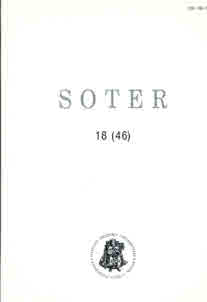Valia Tomo Akviniečio kūrinyje Apie Tiesą (De Veritate Q. 22. aa. 1–7)
Thomas aquinas on human will in de veritate q. 22 aa. 1–7.
Author(s): Elena BūgaitėSubject(s): Christian Theology and Religion
Published by: Vytauto Didžiojo Universitetas
Keywords: gėris; valia; siekis; tikslas; Dievas; good; will; inclination; purpose; God;
Summary/Abstract: The aim of this article is to analyse the main texts of Thomas Aquinas on human will, from his work De Veritate. Infact, all the Question 22 of this book is dedicated to the themes of will. In this article the attention is concentrated from the first untill the seventh part of the Question 22, that is entitled as De appetitu boni, because Aquinas analyses here the seeking of good as a practical capacity of a human beeing. The major terms are presented at the beginning, in order to introduce the reader in the sphere of human will. „Appetite“ – this term is broadly used in the scholastic language and it means a seeking, a desire, an inclination of all that exists towards the ultimate purpose, towards good. The theory of appetite comes from Aristote. Aquinas proposes such a deffinition: appetitus nihil aliud est quam inclinatio appetentis in aliquid (I–II q.8 a.1). According to Aquinas, appetite is manifested in three different manners: a natural, a sensitive and a rational one, because each form has its own inclination (quamlibet formam sequitur aliqua inclinatio). The „good“ is inquired in metaphysics and in ethics: metaphysics underlines the good as a transcendental quality of being; ethics underlines the good as the aim of inclination. The „will“ (lat. voluntas) is capability of human beeing to reach the purposes and realise them. The following structure of the article is based on the sequence of Aquinas’ thought. First of all, there is presented the idea, that all the things are seeking the Good. According to st. Thomas, the human will has a natural, that’s why also necessary, inclination towards a universal good. The good is desired as it is, the bad is desired only accidentally (per accidens). All the things have a natural inclination towards God implicite, but not explicite. God is the first efficiently, so he operates, acts through each agent; similarly, as an ultimate purpose, God is desired in each smaller purpose. But only the rational beeings are capable to ordinate the secondarily purposes towards the ultimate higher purpose, God, explicite. According to st. Thomas, the closer a nature is to God, the more it has capacity to seek the purpose by its own. That’s why the human will differs both from the natural inclinations and from the sensitive inclinations. So, as well as the intellect, the will is non–material capability of human beeing. The human will is indefinite in three its aspects: the action, the object and the purpose order. But a liberty or a free will is not only the indefinition of a will according the object, but mainly it means a capacity to choose.
Journal: SOTER: religijos mokslo žurnalas
- Issue Year: 48/2006
- Issue No: 20
- Page Range: 7-21
- Page Count: 15
- Language: Lithuanian

